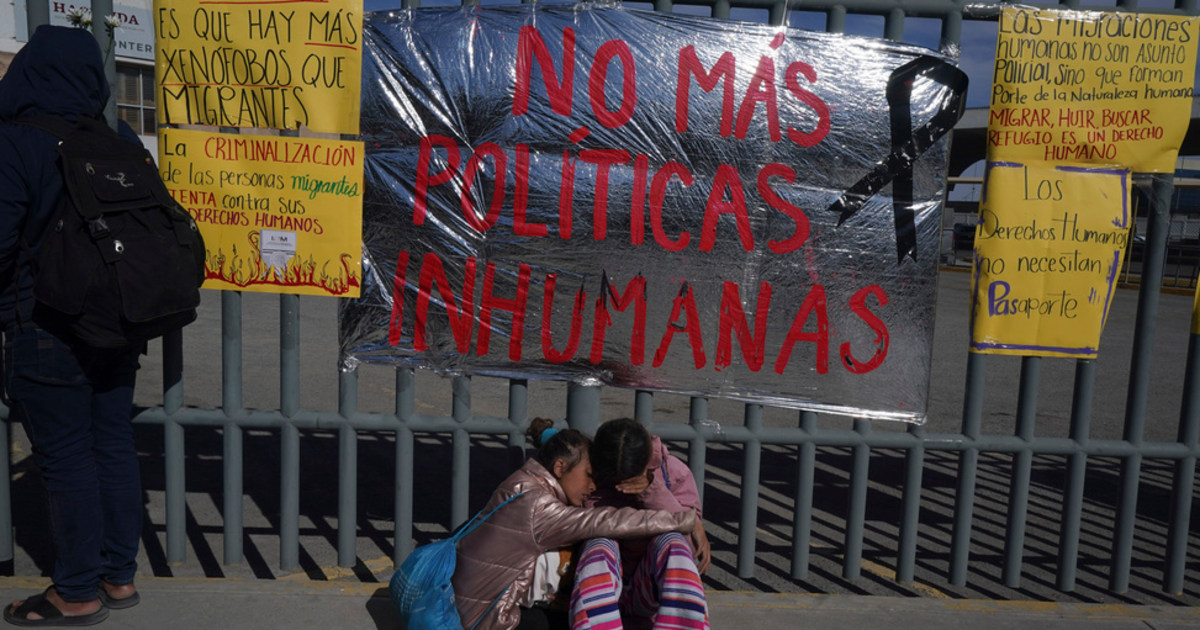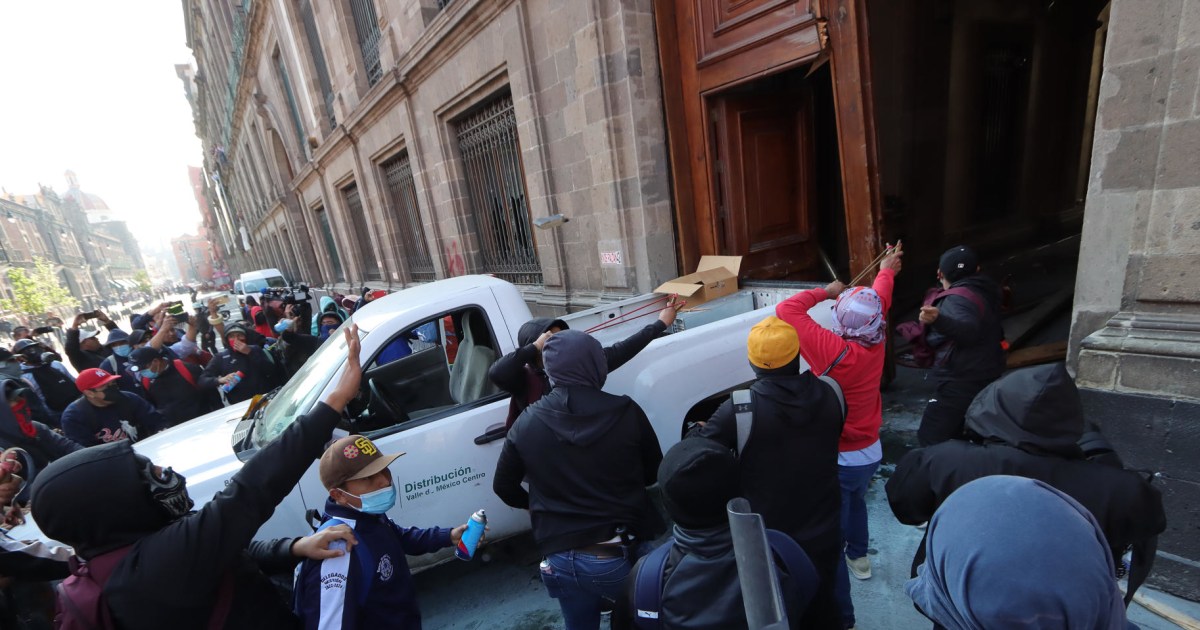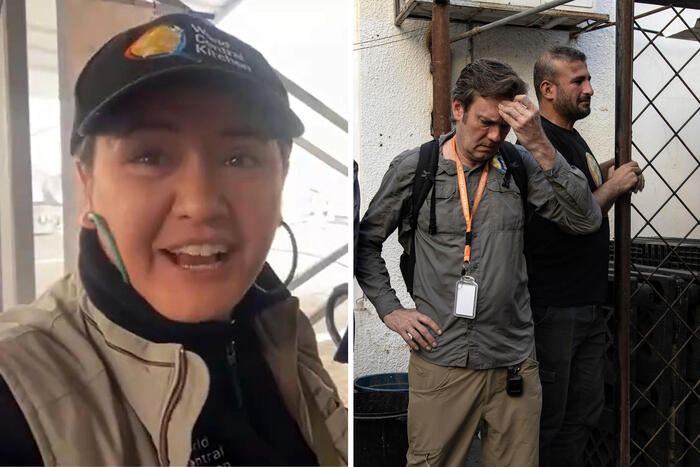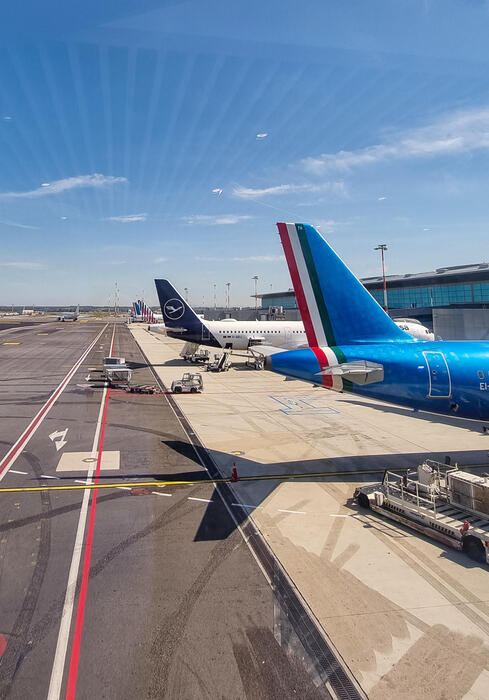Since Thursday, feminist groups in Mexico City - or collectives, as they call themselves - have kept under control the headquarters of the National Human Rights Commission (CNDH), in the center of the capital.
The workers cannot enter and the groups want to turn the facility into a shelter for victims of violence.
Yesenia Zamudio, one of the women who is holding the CNDH, summed up in an interview with journalist Carmen Aristegui the exhaustion surrounding the protest: “We are asking for a life free of violence.
There are so many women who have experienced violence that we are fed up.
Tired of not being attended, of being treated as beggars.
We want them to see us ”.
As a background for the taking of the commission, there is sexist violence in the country.
Every year thousands of women are killed in Mexico.
Last year there were more than 3,000.
This situation has led to a growing mobilization of society, especially women.
On March 8, the capital experienced a massive march.
There were thousands of women, a mobilization that had not been seen since the marches in protest of the disappearance of the 43 students from Ayotzinapa in 2014.
The striking images of the interior showed several women sitting in official offices next to graffiti with phrases such as "we neither forgive nor forget."
At the seizure of the building, the protesters found generous cuts of meat in the refrigerator, which they displayed on the balcony of the building as a sumptuous gesture by the Commission.
The institution responded by claiming that the meat found corresponds to the workers' dining room.
President Andrés Manuel López Obrador has said on the subject that he is against violence and has criticized the ridicule of the image of Francisco I. Madero in one of the paintings found.
"Those who do that either do not know the story (...) or are conservatives," he said this Monday during his usual press conference.
"I understand that there is a lot of pain (...) but violence is not the way," he added.
López Obrador has defended the actions of the head of the CNDH, Rosario Ibarra, of whom he has said that "she is not an academic" and has recalled her history of struggle during the search for her missing brother.
The president has assured that women will not be evicted from the headquarters to "not fall into temptation" and "because we are not the same."
But he defended himself saying that "when we were in the opposition we never acted like this and we faced very strong things."
Zamudio, mother of a murdered young woman, responded to López Obrador: “It is ridiculous that I compare our struggle with the image of that man (Francisco I. Madero).
This is not the fight against the Porfiriato, it is a women's fight for a life free of violence ”.
Another group of women in the CNDH
In addition to feminist groups, there is another group of women at the headquarters of the Commission, relatives of victims of violence.
One of them is María Icela Valdez, originally from Reynosa, Tamaulipas.
Valdez's son disappeared in Reynosa in 2014. "We are 10," the woman explains, "we arrived here on Thursday to support a colleague from San Luis Potosí, who had come to ask for justice for her murdered son."
Valdez refers to Silvia Castillo.
It all started last Wednesday, when Silvia Castillo and a colleague from San Luis Potosí, Marcela Alemán, arrived at the office of the Commissioner for Human Rights, Rosario Ibarra, to ask for support in their children's cases.
Castillo's son had been murdered in 2013 and Alemán's daughter was raped when she was four years old.
The two met with commission officials, but the meetings, unsuccessful, upset the two women.
They decided to chain themselves in the boardroom as a protest.
Alemán even tied himself to a chair so that they would pay attention to him.
Valdez arrived at the CNDH the next day.
She and 20 other victims of violence in the country have held a sit-in since February in front of the offices of the State Commission for Attention to Victims (CEAV), also in Mexico City.
This year, the Government announced a substantial reduction in the CEAV budget.
In practice, Valdez explains, this has meant a halt in the justice processes for which they have been fighting for years.
In her case, the cut means that relatives of the disappeared in Tamaulipas cannot continue with the search for their children, siblings, etc.
Amid outrage at the lack of care, both mothers contacted feminist groups in the capital, which arrived at the CNDH headquarters on Thursday.
At the same time, Alemán y Castillo's protest spurred the CNDH.
On Thursday, an official of the commission traveled with Alemán and her husband back to San Luis Potosí, promising to help them in the investigation of their daughter's case and to help them leave the state.
Meanwhile, the feminists decided to occupy the headquarters of the commission with Castillo inside.
Valdez explains that Castillo was in a very bad mood.
As they are companions of the CEAV sit-in, Valdez and other relatives of the disappeared came to the CNDH to support Castillo.
That was the same Thursday.
On Friday, Castillo left the CNDH with the promise of imminent help from commission officials.
Valdez and nine other people stayed inside.
Since then, their intention has been to leave, but Valdez denounces that the CNDH tries to criminalize them - those who came from the CEAV sit-in - for everything that has happened at the institution's headquarters: the graffiti, the damage, and so on.
Ana María Maldonado, mother of a young man who disappeared in Mexico City in 2010, agrees with Valdez: “We want the CNDH to demarcate us from all this.
We are not the ones who take over the facilities.
That's why we don't go out, because we don't want to be criminalized ”.
For its part, the CNDH issued a statement this Monday, in which it is open to "dialogue" and "to find a satisfactory agreement for both parties."
The CNDH adds that "they support both Silvia and Marcela, as they are working on the commitments they have with the rest of the group of victims who were at the CEAV sit-in."

/cloudfront-eu-central-1.images.arcpublishing.com/prisa/VXNNKFUF45E7XIXMLCBMTFNVQU.aspx)






/cloudfront-eu-central-1.images.arcpublishing.com/prisa/VH72NERTWJEPPEX6A7TCMZLVMU.jpg)



/cloudfront-eu-central-1.images.arcpublishing.com/prisa/KMEYMJKESBAZBE4MRBAM4TGHIQ.jpg)


